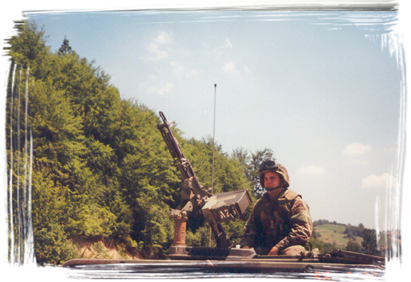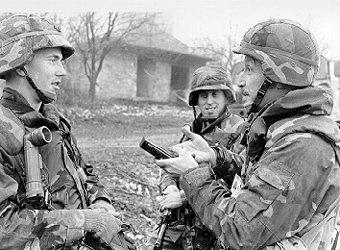 In September of 1996, I was five or six months into my
first trip to the Balkans and had become
fully adjusted to the realities of both life there and of my job. I joined
the military to be an interrogator, which required learning a language. The
Army, in its infinite wisdom, decided that I should learn the Serbo-Croatian
language. This meant that I had a great deal more opportunity to be out in
the real world and work with members of the local populace than most of the
other soldiers in the area. This was especially true for the new Military
Police battalion that had been brought over specifically to help with the
first free elections, the underway. These units had not been fully prepared
for the realities of the situation and for the current conditions in-theater.
While the bloodshed had been stopped for a while, there was still a certain
amount of conflict.
In September of 1996, I was five or six months into my
first trip to the Balkans and had become
fully adjusted to the realities of both life there and of my job. I joined
the military to be an interrogator, which required learning a language. The
Army, in its infinite wisdom, decided that I should learn the Serbo-Croatian
language. This meant that I had a great deal more opportunity to be out in
the real world and work with members of the local populace than most of the
other soldiers in the area. This was especially true for the new Military
Police battalion that had been brought over specifically to help with the
first free elections, the underway. These units had not been fully prepared
for the realities of the situation and for the current conditions in-theater.
While the bloodshed had been stopped for a while, there was still a certain
amount of conflict. The former war was still evident everywhere, because Bosnia did not yet have all of the public services that Americans are accustomed to, up and running. The garbage was not collected in any sort of a regular manner and, litter tended to become endemic and drift all over the place. The walls were full of bullet-holes of various calibers from the fighting. There was a lot of pollution in the area and because there were no public services, the area had a tendency to seem very grim and dirty. There was also a lot of graffiti in the area, primarily various Serbian pride symbols. Originally, these were most likely drawn in an attempt to intimidate the other ethnicities into leaving the region (ethnic cleansing), but they could also be intimidating to new soldiers not accustomed to the area. The more graffiti there are, the more vehement the Serbian pride, which can become dangerous.
I was attached to one of the military police units to assist with any interpreting as needed. It was approximately four in the afternoon, and I had been working with the unit since approximately four o’clock in the morning, driving around our sector of Bosnia looking for any trouble and generally making our presence known at the polling places. By now, I was already pretty much exhausted, having spent what started out as a cold day, but warmed up fairly rapidly wearing the hot ‘full battle rattle’ that was required of all soldiers working on post. Full battle rattle is close to 50 pounds worth of gear, including a flak vest, Kevlar helmet, gas mask, ammunition, weapons, and other basic military equipment.
 Other than basic introductions, I had not had a chance to speak with anyone
in the unit very much, as it was a very busy day and my assignment had only
been determined that morning. This meant that the other soldiers did not understand
what my separate, and primary, intelligence-gathering mission entailed. My
primary mission, as always when off camp, was to speak with the local populace,
and attempt to gather information that could be important to the mission,
as well as local issues and any potential threats to soldiers.
Other than basic introductions, I had not had a chance to speak with anyone
in the unit very much, as it was a very busy day and my assignment had only
been determined that morning. This meant that the other soldiers did not understand
what my separate, and primary, intelligence-gathering mission entailed. My
primary mission, as always when off camp, was to speak with the local populace,
and attempt to gather information that could be important to the mission,
as well as local issues and any potential threats to soldiers.My name is Sergeant John Smith. I was one of the military police brought into the Balkans specifically for the elections. Most of the soldiers in-country had been there for almost a year by the time that we arrived. Often this meant that they expected us to know a lot about the mission that we had not had a chance to learn. On this particular morning, a military interpreter had been assigned to our unit just before we were preparing to leave. It was pretty standard that we would have an interpreter assigned to us when were off camp, in case we should need to communicate with the local people, but it was rare to have a military one as they were usually reserved for more important missions.
At one of the larger stops, there was a large crowd of people who had been bussed in from other locations so that they could take part in the voting at their assigned polling place. It was loud and dirty with the constant smell of bus exhaust hanging in the atmosphere. No one was approaching the military police observers, which meant that they did not need my services, so I therefore took a radio, borrowed an escort, and went out into the crowd to work on my primary mission. I had been out in the crowd engaging in some fairly intense conversations when my escort mentioned to me that the rest of the unit had formed into a combat formation. I was surprised that they did this without radioing me to inform me of a potential threat. By the time I was able to move to a position from where I could see the unit, I was quite surprised to see that they had not only moved into a tight combat formation, but had also put up a portable fence and were pointing a .50 caliber machine gun precisely in my direction. I realized that my position had been out of sight of the observers and that because I was only that morning attached to the unit they had probably forgotten I was even there. I also knew that since they were new in the country, they were probably misinterpreting the lively, and occasionally agitated crowd as the precursor of a riot and were preparing to defend themselves. This would have put me directly in their line of fire. A queasy feeling came over me when I realized that they no longer considered a member of the group of soldiers, but rather just another Bosnian Serb. For the first time in my life, I truly understood what it was like to be a member of a group that was feared and potentially hated by others with military might.
At this particular stop, we were facing a large number of bussed-in Serbians and were very concerned about safety and the possibility of a riot. Everywhere we looked we saw the pride symbols that we had been warned in training showed a strong ethnic pride presence and we were to beware of this. It always seemed that no one in that country had bathed for weeks, and there was almost no way to tell who supported Americans from who disliked us unless they came out and said so. There was supposed to be a private with Specialist Hunt, but I guess that he somehow got diverted from this mission. This most likely played a role in the incident that Hunt is referring to, because he was not truly a member of the unit and without the private with him we did not even think about his location. We set up the perimeter wire and the machine gun posts without checking on his position. It is easy to understand how he could feel betrayed when he looked up from his conversation and saw the .50 caliber pointed in his direction.
Working in Bosnia immediately after the cease-fire led to one of the most emotional experiences I have ever had of feeling different. The feeling was rather short-lived as it was due to a misunderstanding of my mission by inexperienced soldiers and a failure on my part to better communicate exactly what I did. But that momentary sense of awareness of seeing myself as Other provided me with an emotional jolt that has made a lasting impact on me.
This incident remained in my mind for a much longer time than I would have expected. I was involved in many other incidents during the time that I remained in the Balkans, incidents that I would normally feel were even more rattling than this one. As I have worked on this project, I spent a considerable amount of time trying to think about why I originally felt that this incident would make a good representation of a case of borderlands. In this one incident I truly felt like an outsider. I was supposedly part of a group of people with whom I had no more in common than the uniform that we wore, and was working with another group of people that should have been seen more as an enemy. But instead the Serbians came to be more like my compatriots during the few minutes that the incident lasted. In my mind, a major reason that this has remained with me is because I momentarily felt very betrayed by the soldiers with whom I was working. I had initially thought that if the barbed wire was up, there must be some danger that I could not see and I wanted to know why they had not informed me of it instead of leaving me unprotected, and at their mercy, in my current location.
I often felt like an outsider in the military due to the nature of my duties, both to communicate with the local people and because my mission was non-combat in nature, and the way in which that naturally separated me from anyone not in the military intelligence field. I never imagined that these differences would potentially put me in danger. This incident, in many ways, seemed to coalesce those feelings into an identifiable object that told me that I was very different. Up until this time I felt that I was probably over-analyzing the situation and my discomfort was only because it was necessary for me to spend more time with non-Americans than I did with Americans. My coworkers occasionally commented on this fact, and they would kid with me about becoming ‘native’. In this incident they treated me as if I had become native and was no longer a member of the group on which I depended. In a curious and disconcerting way I had, therefore, become transnational, not truly belonging to either group.